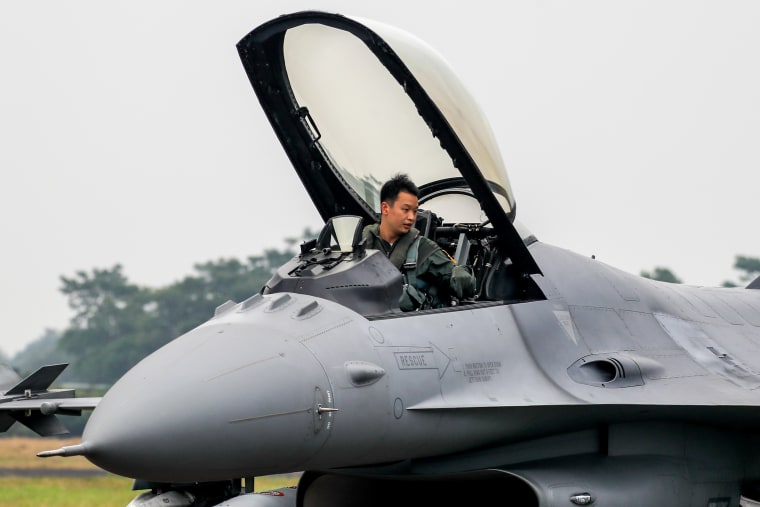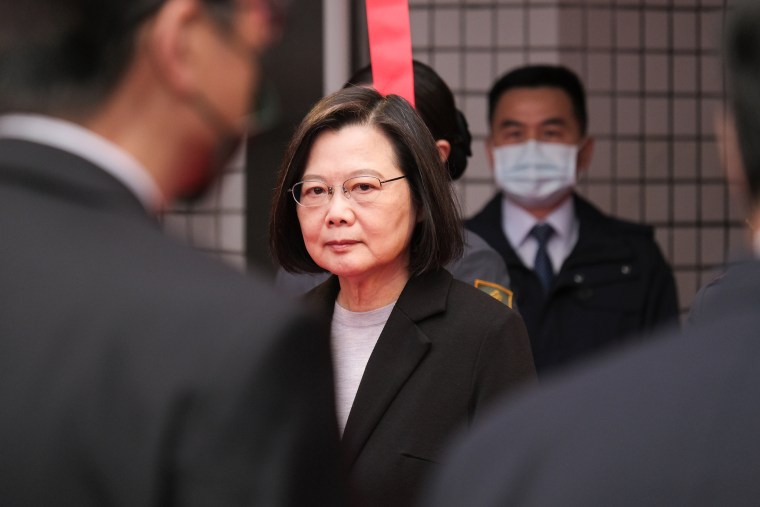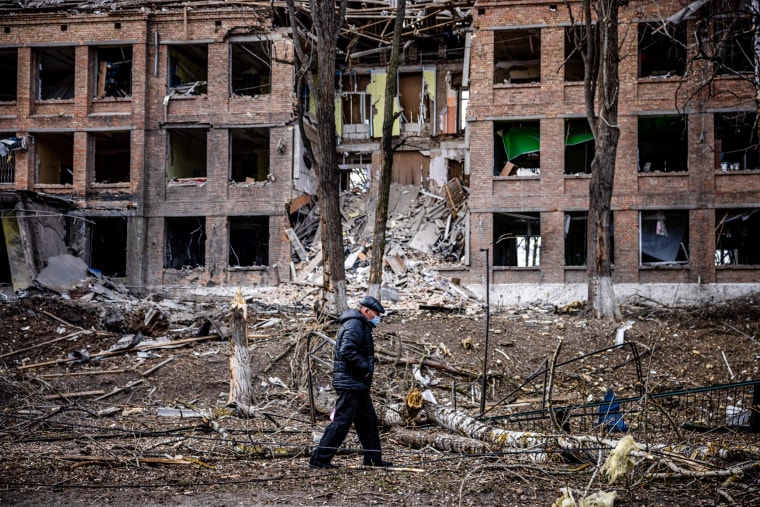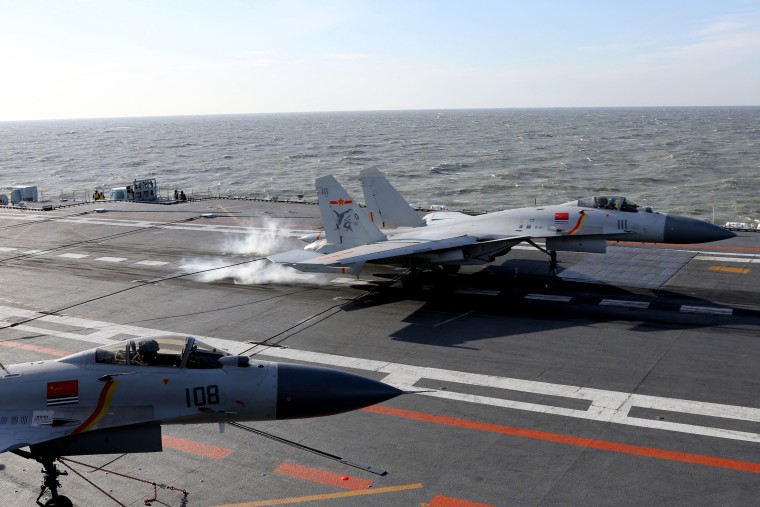TAIPEI, Taiwan — As Russian forces push ahead with their assault on Ukraine, leaders in both China and Taiwan are closely watching the situation and how Western governments respond.
Russia’s invasion of Ukraine has generated enormous sympathy in Taiwan, a self-ruling island that Beijing claims as its territory. Chinese President Xi Jinping has not ruled out the use of force in a “reunification” with Taiwan that his Communist Party government insists is inevitable.
On Friday, the Taiwanese Foreign Ministry said it “strongly condemns” Russia’s invasion of Ukraine and will join international economic sanctions. But Taiwan also has an eye on its own security, with President Tsai Ing-wen saying last week that the military must heighten surveillance.
Taiwan has not reported any unusual maneuvers by the Chinese military in recent days. But in the last two years Beijing has ramped up what Taiwan has condemned as military aggression, regularly sending warplanes close to the island to deter what China perceives as a growing campaign for Taiwan independence. Last Thursday, as Russia began invading Ukraine, Taiwan was approached by nine Chinese aircraft, the defense ministry said.
“Ukraine today, Taiwan tomorrow?” some headlines in Taiwanese media asked on Friday.
Download the NBC News app for breaking news and politics
Enoch Wu, a member of Taiwan’s governing Democratic Progressive Party (DPP), declined to speculate on the likelihood of a Chinese invasion, but said Taiwan and Ukraine faced the same threat: “a revisionist power claiming another sovereign country as its own.”
“I think this serves as a very good wake-up call that war is a modern possibility,” he told NBC News on Thursday after the invasion began. “People have talked a lot about the future of warfare being all about cognitive warfare, only about misinformation, but when push comes to shove tanks will roll.”

But fears of imminent Chinese invasion are unfounded for a number of reasons, experts and Taiwanese officials say. One is geography: While Ukraine and Russia share a 1,200-mile land border, Taiwan is an island separated from mainland China by 100 miles of water.
That means any Chinese invasion would be a large-scale, complex operation that the world could see coming well beforehand, said Wen Lii, a DPP member on Matsu, a Taiwanese island about 10 miles off the coast of mainland China.
“An amphibious assault of this size would require a massive, time-consuming buildup of Chinese troops along the coast, with many indicators noticeable several months in advance through satellite imagery,” Lii said last week through a messaging app.
Taiwan, a major exporter of electronics and semiconductors, also plays a much bigger role in the global economy. While Taiwan is Washington’s ninth-largest trading partner, Ukraine ranks 67th, according to the U.S. Trade Representative.
Washington is highly focused on the security of Taiwan, said Ryan Hass, a senior fellow at the Brookings Institution. The Biden administration’s Indo-Pacific strategy, released in February, said the U.S. would work to “maintain peace and stability in the Taiwan Strait,” drawing criticism from China. The U.S. is also required to provide Taiwan with defensive weapons under the Taiwan Relations Act.
Hass said that as a thriving liberal democracy in a region where autocracy is on the rise, Taiwan also has greater “symbolic resonance” for Americans than Ukraine, where democracy is less solidified.
China also sees Taiwan as different from Ukraine, but for a different reason: It is an “inalienable” part of Chinese territory and not a sovereign nation, government officials say. They have accused Tsai of “exploiting” the Ukraine crisis to gain international support for the island, where China’s Nationalists fled and established a rival government in 1949 after being defeated by the Communist forces of Mao Zedong.

Since 1979, the U.S. has recognized the government in Beijing as China’s only legitimate government. But its position on Taiwan is ambiguous, neither recognizing Chinese sovereignty over Taiwan, nor recognizing Taiwan as a sovereign nation. U.S. Secretary of State Antony Blinken confirmed last year that there had been no change to Washington’s “one China” policy.
China’s growing ties with Russia have also raised fears for Taiwan. In a joint statement Xi and Russian President Vladimir Putin signed in Beijing in February, Russia reiterated its opposition to Taiwan independence in any form.
But Western leaders should not overestimate the strength of the China-Russia relationship, said Kadri Liik, a senior policy fellow at the European Council on Foreign Relations who studies Russia. Like the United States, she said, Russia has security concerns about Chinese technology and has been a target of its aggressive “wolf warrior” diplomacy. It also chafes under China’s power to set the economic terms of their relationship.
“They have managed to desecuritize the relationship so that neither expects danger from the other, but they keep it in a very flexible framework so there are no formal alliance obligations,” Liik said in an interview last week after the invasion began.
But with Russia’s relations with the West immeasurably damaged, Liik said that Moscow could end up more dependent on China, and that it would be unlikely to oppose Chinese military action against Taiwan given its own actions in Ukraine.
Wu — the founder of Forward Alliance, a Taiwanese organization promoting civilian readiness for conflict and emergency situations — said that with the world focused on Ukraine, Taiwan should avoid escalating tensions with Beijing and better prepare for possible aggression.
“The lesson [from Ukraine] is every country needs to own the responsibility of defending itself,” he said.
Hass said he hoped Taiwan’s leaders would “find ways to instill confidence in the Taiwan people in the future of Taiwan — in other words, not succumb to fear or anxiety.”
He advised leaders in Washington, where some are calling for more explicit commitments to defend Taiwan, to remember Theodore Roosevelt’s philosophy of “speak softly and carry a big stick.”
“My hope is that American policymakers will take a steady, principled, disciplined approach to finding ways to bolster Taiwan’s security within the parameters of our longstanding policy, rather than heightening tensions,” Hass said.

Meanwhile, most people in Taiwan see the threat from China as largely unchanged. In a survey conducted Feb. 14-15 by the Taiwanese Public Opinion Foundation, more than 60 percent of respondents said they did not believe Beijing would invade Taiwan in the event of Russian-Ukrainian conflict.
“Discussions about Chinese threats are usually based on concrete intelligence instead of a foreign crisis,” Lii said.
Tina Chang, a 30-year-old resident of Taipei, the Taiwanese capital, said she saw a parallel with Taiwan in the sense of calm that seemed to pervade Ukraine right up until the Russian military assault.
“Most people in Taiwan, we don’t think that China will invade us whatsoever,” she said last week, adding that the crisis in Ukraine “shows that anything can happen, and we need to prepare for what will happen in the future as well.”
